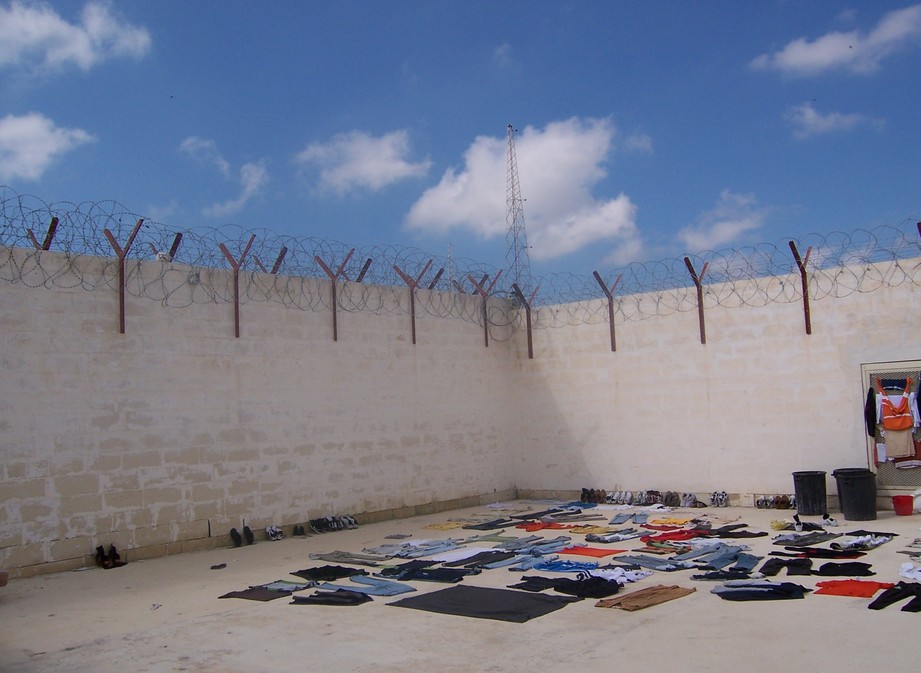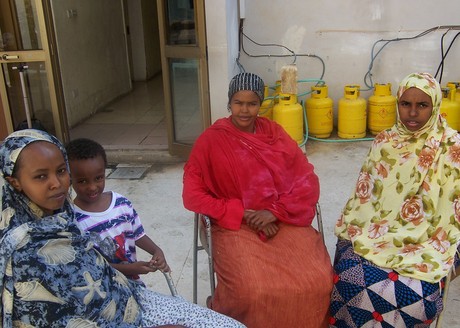
It does not take a lot of deductive reasoning to figure out why France's President Nicolas Sarkozy was so eager to lead a coalition of nations in the "liberation" of Libya. Realpolitik may have played a far greater role than matters of the heart in the case for intervention. The politically disastrous prospect of tens of thousands of North African and Sub-Saharan migrants pouring into France is untenable from Sarkozy's perspective, given the electoral threat posed by the country's far-right. For the same reason it is also clear why Italy's Prime Minister Silvio Berlusconi was compelled to join the Western chorus protesting Libyan aggression against its citizens, even though the Prime Minister has long enjoyed a cozy relationship with Col. Muammar Gaddafii. African migration is the bete noire of Europe and migrants of every shade are boogeymen to be feared. However, Sub-Saharan Africans and Muslims, according to a multitude of polls on European attitudes toward immigration, are especially feared.
Thousands upon thousands of black Africans from Somalia, Eritrea, Niger and elsewhere have settled in Libya in the past decade with the hope of going from there to Europe. Around 150 African refugees fleeing Libya drowned in early April after their boat capsized in the Mediterranean. Before the conflict, treaties between Libya, Italy and the EU had effectively stemmed the flow of migrants heading north. Now, with the country in chaos, thousands of migrants are finally fleeing to Europe, but nowhere in the numbers that likely would have queued up on the shores of Libya and Tunisia had the West not intervened to head off a stampede to the borders. Even with the Arab populations of Benghazi and other Libyan cities in the East now protected by a NATO no-fly zone, thousands of panicked Libyans, Tunisians, Somalis and Eritreans are still jumping into boats and heading across the Mediterranean to the Italian island of Lampedusa. Others have been picked up off the coast of Malta. Almost all of them find themselves in migrant detention centers. 
Day after day, Daniel sits on a wooden crate on a busy corner in the oldest piazza in Malta's capital, Valletta. After leaving his native Ghana and trekking through desert and seven African countries, Daniel arrived in Malta eighteen months later, only to spend another 18 months in mandatory detention:
"After I came out I could not get any proper documents," he said. "So I'm in Malta here for nothing."
I ask him how long has he been looking for work. "I've been here so many times. Since I've started to come to this corner, I haven't received what I like. So I'm still waiting. We are just sitting here for nothing, no work to do. So we don't know what to do here. Even though you can see many, many blacks, and many immigrants here, they are just roaming about, doing nothing."
At the outdoor bus terminal, dozens of dark-skinned men tell similar stories:
"The situation in Malta is critical."
Salif came from Nigeria, and like many migrants stuck her in Malta, he had hoped to get to mainland Europe.
"The immigrant here is suffering."
I ask him: "why Malta? why did you come here?"
"Well we were going to Italy but along the line we get to Malta."
"If you can't stay in Malta, where would you like to go," I ask:
"I would like to go to Italy, Spain, but they cannot give me passport. "
"So you have no passport, so you are basically stuck here in Malta?"
"Yes, I do not have passport to leave. That's why I'm here."
Malta's Justice Minister, Carmelo Mifsud Bonnici, is sympathetic, but only to a point.
"And so this Nigerian fellow feels that he has got the wrong deal because had he come to Italy the situation would have been completely different. Because he would have been an asylum applicant there and that would have allowed him to move along. I have only one solution. To send them back to their countries of origin, which is difficult."
Difficult because Malta doesn't have repatriation agreements with most of Africa. "How to repatriate persons who are economic migrants, who are not in any way involved in the labor market , is an issue."
That means it can't send these migrants home; and it can't send them on to third countries, So many languish here in Malta. And for many white Maltese, that's a problem: Yuriken Borsch, A 16-year-old student, fears the migrants are overwhelming his tiny island nation.
"We're a small country and we have many illegal immigrants for a small country that we are. Every immigrant someday will have to buy a home in Malta and there's no place for them."
That is why most Africans in Malta end up in the Hal Far open centre.
"It was an airplane hanger here," a Somali man said, who asked to be identified as "Ahmed."
Ahmed took me on tour of the restricted Maltese facility. It is an old airplane hanger, lined with bunk beds and home to African men and women released from detention. The men and women live in separate facilities.
Despite the rank odor of porta-potties and overflowing kitchen waste, no one appears to be malnourished or abused. But Ahmed said Hal Far is unfit for human habitation:
"I can't live in this situation. I told them, the government, I would prefer to go to my home country to living here. I have no place to sleep; Nothing to eat. I don't have anything, so I prefer to go to Somalia, and they told me you can't go to Somalia because Somalia is a dangerous place."
"These large numbers of people who are new comers to our society need to be housed somewhere," said Alexander Tortell, the director of the Agency for the Welfare of Asylum Seekers. "We cannot house them on ships. We cannot house them in the countryside, which we do not have. And, therefore, these people are placed either in open centers or else when they leave the open centers, they themselves make their own arrangements to live in the community.
Some also live in the Rainbow House outside of the capital city. True to its name, a spectrum of bright colors decorates the front door. This is one of several government-run homes for migrant women, children and families, most of them from Somalia.
Herta Tropinai, a social worker who runs this facility, said the neighbors aren't happy.
"To say the truth we have had a lot of complaints -- about the noise, about the fact that we've got a lot of rubbish outside. They are petty things, but they sometimes have a good reason for it. But they wouldn't cause these problems if they were Maltese people."
Alexander Tortell does not disagree:
"Well I think it (skin color) is a factor, and I would add sadly that a persons appearance determines the success or otherwise of integration. The difference between the Bosnian, and I would add, Albanian arrivals, is that it was more silent in the sense that, let's just take 2008 arrivals, for example, 2775 persons arriving all at once practically in the space of a few months."
Until recently, Rainbow House resident Abdul Aziz and his family lived in the open camps.
"This house is better. Before I lived in Hal far. But this house is better for me. It's near my job."
"What is your job?" I ask.
"Paint."
"You're a painter. Is it full-time?"
"Not full time. Maybe six hours, five hours, always."
"Was it difficult to find a job?"
"Yes."
The Maltese government gives each asylum seeker a stipend of about one hundred Euros per month. But even that meager amount has stirred resentment among some Maltese who believe that Europe is being overwhelmed by African asylum seekers. In some instances, that has led to violence against migrants AND their supporters:
"On two instances, someone came on the grounds of two of our communities and cars were set alight," said Father Joseph Cassar of Jesuit Refugee Service of Malta -- OR JRS.
"And then just one month later. It was the car on the front door of our human rights lawyer while the family was inside at night. Although no one has been caught or indicted or anything of this sort, we can very much say that this has to do with the position which JRS has been taken advocating the rights of asylum seekers and refugees."
Justice Minister Carmelo Mifsud Bonnici accuses the right wing media and others of stirring up racist anti-immigrant opposition.
"Unfortunately we had a rise of political speeches from different parties saying you should get these persons as soon as they come here and get them another boat and send them back from where they came. These arte all the roots of an alarmist approach, because in point of fact we have in this country less than 5000 persons resident here, so we are speaking of one person who is a colored skin to a thousand."
But with more than 5,000 migrants stuck in this tiny country, government officials like Alex Tortell fear a greater backlash if the migrants cannot be integrated into society.
"The experience of integration all over Europe is that integration cannot start -- in the strict sense of the word -- before a person has a full time legal job. Unfortunately, because of Malta's limitations, we have thousands of people who haven't gotten to that point and we have to admit, they won't get to that point because we can not get to that point because the limitations, the limitations are real."
Some illegal migrants qualify for what's known as subsidiary status, which allows them to go to another European Union country. But thousands remain stuck in Malta, jobless and living in difficult conditions -- eager but unable to leave that tiny island nation.
